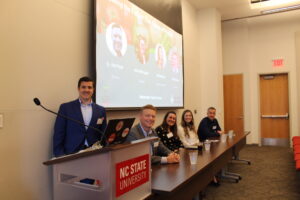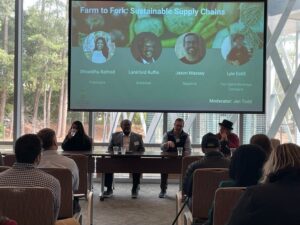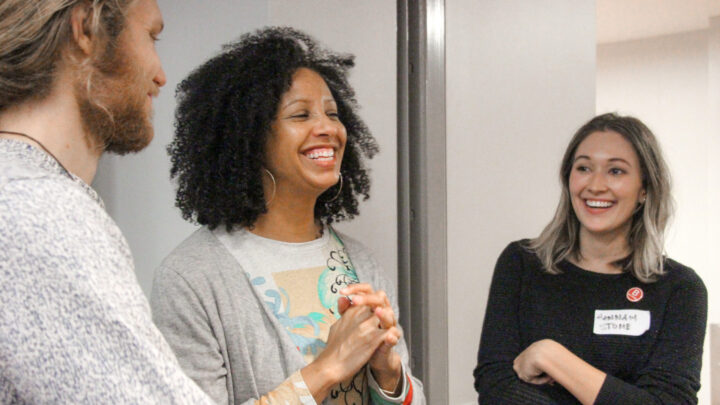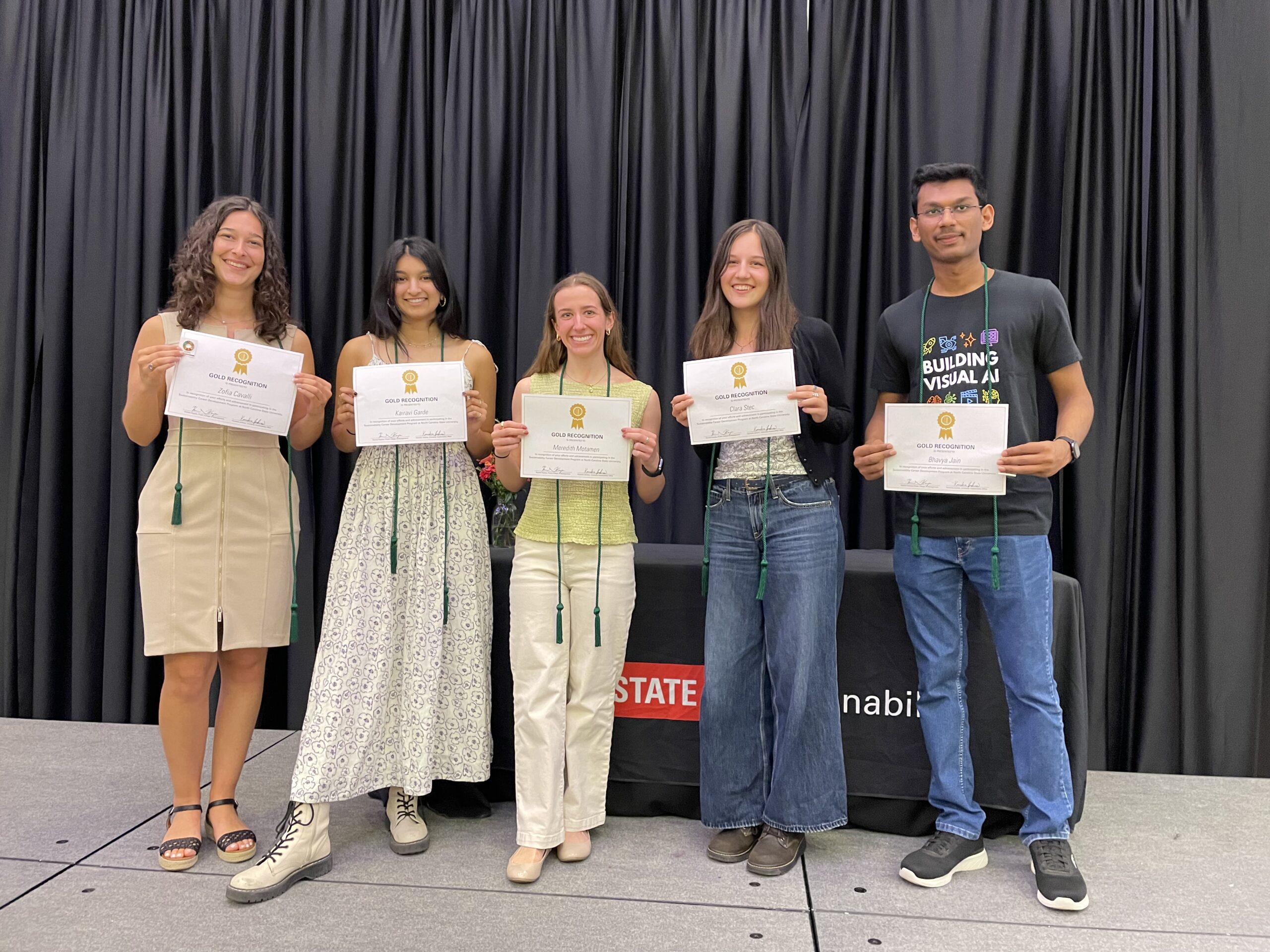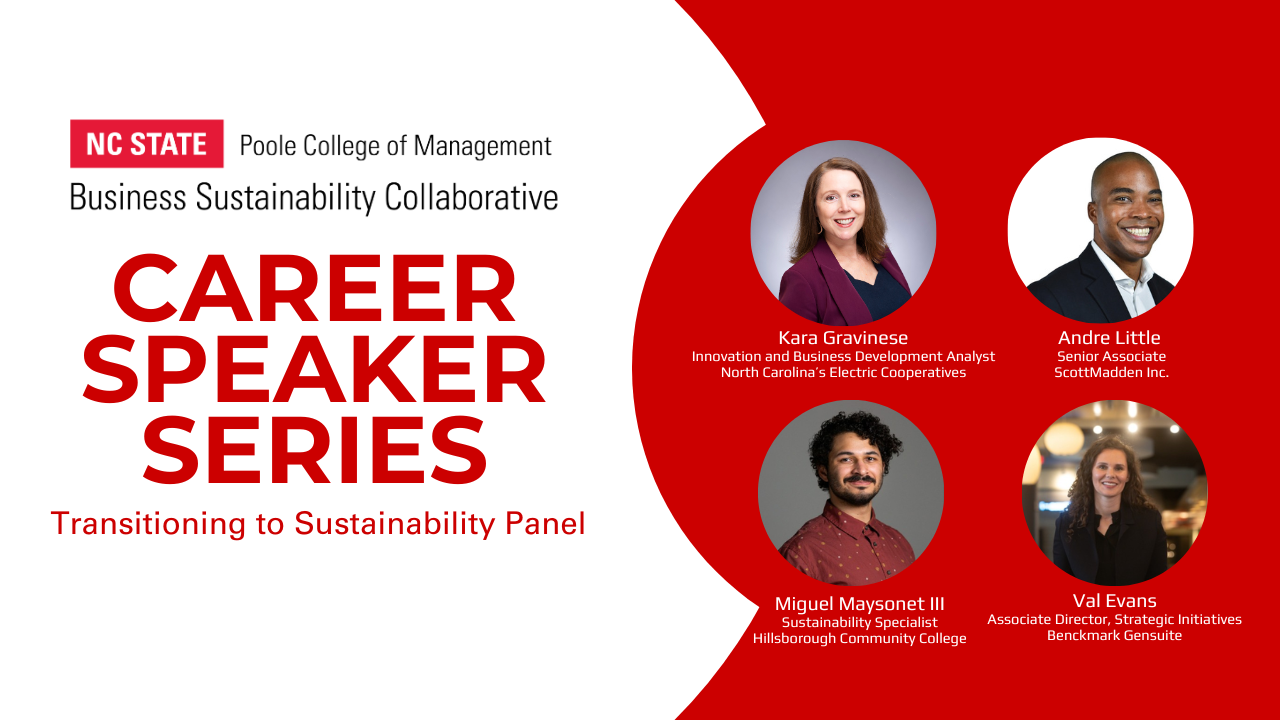Takeaways from MBA FoodCon 2023: Cultivate the Future
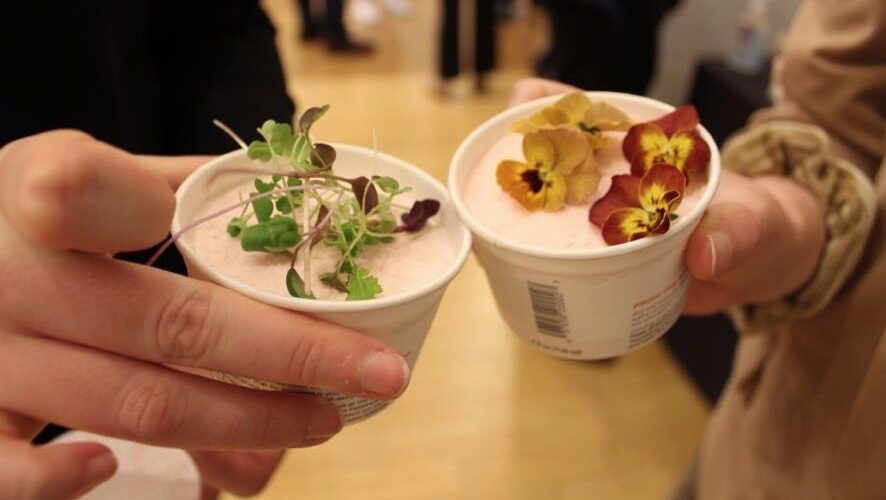
On Thursday, February 16th, 2023 NC State’s Jenkins MBA students in collaboration with UNC’s Kenan-Flagler MBA students, and Duke’s Fuqua MBA students co-hosted the 9th annual MBA FoodCon conference. This event brought together a diverse group of over 150 students, community members, business leaders, and industry experts to increase awareness and understanding of the sustainable food industry. This year’s conference was the third time NC State hosted the conference and first time back in-person for this conference since 2020. The student planning committee did an incredible job hosting this event and there were several memorable and insightful discussions throughout the conference. Here are some highlights from the conference.
Keynote Speakers
Karl Binns Jr., Black Farmer Equity Manager – Cargill Inc.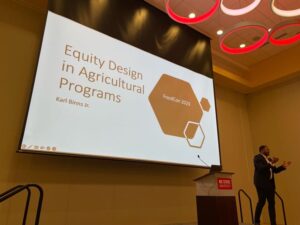 Karl’s keynote focused on the importance of engaging at the margins. He discussed the importance of working to bring in voices and perspectives of those typically not included to design innovative solutions that address the needs of a broad range of stakeholders and speak to the future. When tackling a strategic challenge, he encouraged the audience to ask “who else needs to be in the room?” Karl leads Cargill’s Black Farm Equity Fund which works with Black farmers to support them to build their competitiveness. The fund is designed to increase access to markets, capital, information and technology with the goal of creating more equity in the agricultural economy.
Karl’s keynote focused on the importance of engaging at the margins. He discussed the importance of working to bring in voices and perspectives of those typically not included to design innovative solutions that address the needs of a broad range of stakeholders and speak to the future. When tackling a strategic challenge, he encouraged the audience to ask “who else needs to be in the room?” Karl leads Cargill’s Black Farm Equity Fund which works with Black farmers to support them to build their competitiveness. The fund is designed to increase access to markets, capital, information and technology with the goal of creating more equity in the agricultural economy.
Matt Tripp, Division Business Manager – John Deere
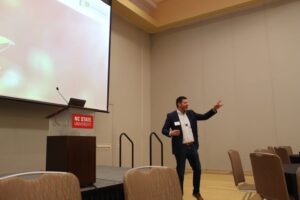 Matt’s keynote focused on how technology will drive the future of agriculture. He shared examples of how John Deere is working to develop innovative equipment to build more efficiency and sustainability into our food systems such as the company’s See and Spray technology which can identify a weed down to a quarter of an inch and spray just the weed instead of the entire trench, resulting in a 60% reduction in fertilizer use. Other examples included autonomous solutions for tillage and new financing models allowing farmers to only pay for equipment while it’s being used. Matt’s keynote demonstrated that even for a 187 year old company, there are still opportunities to innovate.
Matt’s keynote focused on how technology will drive the future of agriculture. He shared examples of how John Deere is working to develop innovative equipment to build more efficiency and sustainability into our food systems such as the company’s See and Spray technology which can identify a weed down to a quarter of an inch and spray just the weed instead of the entire trench, resulting in a 60% reduction in fertilizer use. Other examples included autonomous solutions for tillage and new financing models allowing farmers to only pay for equipment while it’s being used. Matt’s keynote demonstrated that even for a 187 year old company, there are still opportunities to innovate.
Entrepreneurship For Sustainable Food
The Entrepreneurship For Sustainable Food panel featured entrepreneurs from Piedmont Food Processing Center, The Plant, Piedmont Microgreens, Raleigh City Farm, and Snap Pea. The recurring theme in this panel was a strong need to educate the public about the importance of buying food locally and how that impacts personal health, the community and the health of our environment. Local, sustainable operations and businesses are part of what creates a sense of “place”. Place as defined by its unique features, unique spaces where people can interact with others in the community and that help define what that place is. The businesses represented on this panel are all unique and add to the North Carolina experience. Another takeaway was the importance of starting a business with a values-based purpose in mind. Whether that be sustainability, paying fair wages, employee happiness, growing a local economy, reducing waste, better nutrition and beyond.
Farm to Fork: Creating Sustainable Supply Chains to Your Table
The Farm to Fork: Creating Sustainable Supply Chains to Your Table panel had representatives from Freshspire, Butterball, Ndustrial, and Fair Game Beverage Company focused on how to build better supply chains in this industry. Jason Massey gave great advice to students to take more risks in the beginning of their careers. The opportunity to work for new and upcoming coming startups and companies can add incredible value to your work experience and give you an opportunity to help drive innovation. When the topic of ESG within business came up, Lankford Ruffin mentioned “Make sure you think about the human factors. That there are people that come after us. The people pillar in the ESG supply chain is key”. The audience left his panel quite inspired by the various representatives within this space.
Growing the Future (plant based protein, lab grown protein, farm grown protein)
The Growing the Future panel featured representatives from Terviva, BioMilq, Grayhouse Farm, and Jellatech. These organizations are innovating towards future demands; using their understanding that the landscape of current protein resources is non-sustainable. All of this is in effort to help shape the future market with alternative options for consumers and businesses. All of the members of the panel were operating in unique industries that were non-competitive to one another, and the panelists believe that each organization brings something unique to the field of protein development with a unanimous objective of improving the sustainability of protein-based product design.
Cultivating Equity in Food, Food Production, and Food Security
The Cultivating Equity in Food, Food Production, and Food Security panel featured the Black Farmers Hub, Sinnovatek, A Place at the Table, Planet Based Foods Institute, and Butterball. This panel started with a poem by Joy Harjo called “Perhaps the World Ends Here”, a thought provoking yet symbolic poem about how many important things in life, including eating happen at a table. NC State Alumni Andrew Gravens spoke about “the equity of choice” and how at A Place at the Table they offer customers “choice” with a breakfast plate of 18 different options. He said: “food is a basic need, but so is connection.” and “when you’re eating, it turns on the pleasure part of your brain, and you end up talking about things you might not have had before you had food in your belly.” Food as a vehicle for more equitable communities was a key theme. Demetrius spoke about how at Black Farmers Hub they use food to build community — they recently had over 30 farmers gather to brainstorm and speak with diff. local agencies and even RTI. Lastly, Renee spoke about how PBFI aims to “Talk about plant foods expansively” and how she arrived in the food policy space through her work in public health with black maternal health policies. Proving how food is connected to everything in the equity space.
Congratulations to our FoodCon 2023 planning team this year, well done! Thank you to all of our volunteers at this year’s event as well as our sponsors: The Dairy Alliance, John Deere, Business Sustainability Collaborative at Poole College of Management, and the Jenkins MBA Student Association.
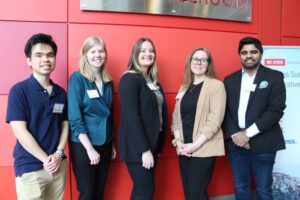
Join us next year at UNC Chapel Hill for the 10th annual MBA FoodCon celebration!
